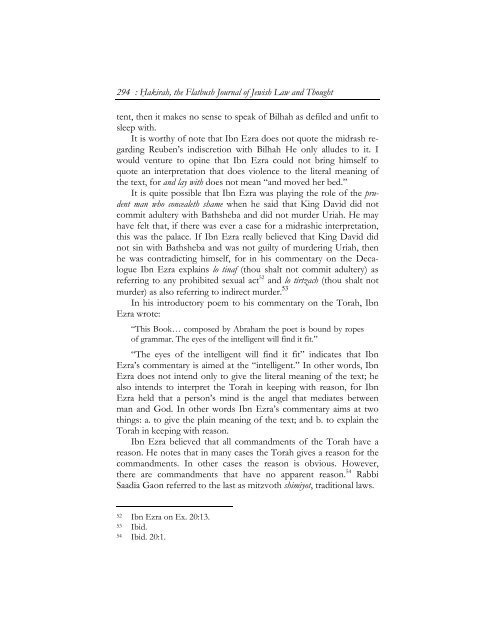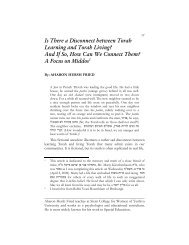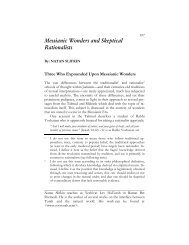Abraham Ibn Ezra's Non-Literal Interpretations - Hakirah.org
Abraham Ibn Ezra's Non-Literal Interpretations - Hakirah.org
Abraham Ibn Ezra's Non-Literal Interpretations - Hakirah.org
Create successful ePaper yourself
Turn your PDF publications into a flip-book with our unique Google optimized e-Paper software.
294 : Hạkirah, the Flatbush Journal of Jewish Law and Thoughttent, then it makes no sense to speak of Bilhah as defiled and unfit tosleep with.It is worthy of note that <strong>Ibn</strong> Ezra does not quote the midrash regardingReuben’s indiscretion with Bilhah He only alludes to it. Iwould venture to opine that <strong>Ibn</strong> Ezra could not bring himself toquote an interpretation that does violence to the literal meaning ofthe text, for and lay with does not mean “and moved her bed.”It is quite possible that <strong>Ibn</strong> Ezra was playing the role of the prudentman who concealeth shame when he said that King David did notcommit adultery with Bathsheba and did not murder Uriah. He mayhave felt that, if there was ever a case for a midrashic interpretation,this was the palace. If <strong>Ibn</strong> Ezra really believed that King David didnot sin with Bathsheba and was not guilty of murdering Uriah, thenhe was contradicting himself, for in his commentary on the Decalogue<strong>Ibn</strong> Ezra explains lo tinaf (thou shalt not commit adultery) asreferring to any prohibited sexual act 52 and lo tirtzach (thou shalt notmurder) as also referring to indirect murder. 53In his introductory poem to his commentary on the Torah, <strong>Ibn</strong>Ezra wrote:“This Book… composed by <strong>Abraham</strong> the poet is bound by ropesof grammar. The eyes of the intelligent will find it fit.”“The eyes of the intelligent will find it fit” indicates that <strong>Ibn</strong>Ezra’s commentary is aimed at the “intelligent.” In other words, <strong>Ibn</strong>Ezra does not intend only to give the literal meaning of the text; healso intends to interpret the Torah in keeping with reason, for <strong>Ibn</strong>Ezra held that a person’s mind is the angel that mediates betweenman and God. In other words <strong>Ibn</strong> Ezra’s commentary aims at twothings: a. to give the plain meaning of the text; and b. to explain theTorah in keeping with reason.<strong>Ibn</strong> Ezra believed that all commandments of the Torah have areason. He notes that in many cases the Torah gives a reason for thecommandments. In other cases the reason is obvious. However,there are commandments that have no apparent reason. 54 RabbiSaadia Gaon referred to the last as mitzvoth shimiyot, traditional laws.52 <strong>Ibn</strong> Ezra on Ex. 20:13.53 Ibid.54 Ibid. 20:1.
















